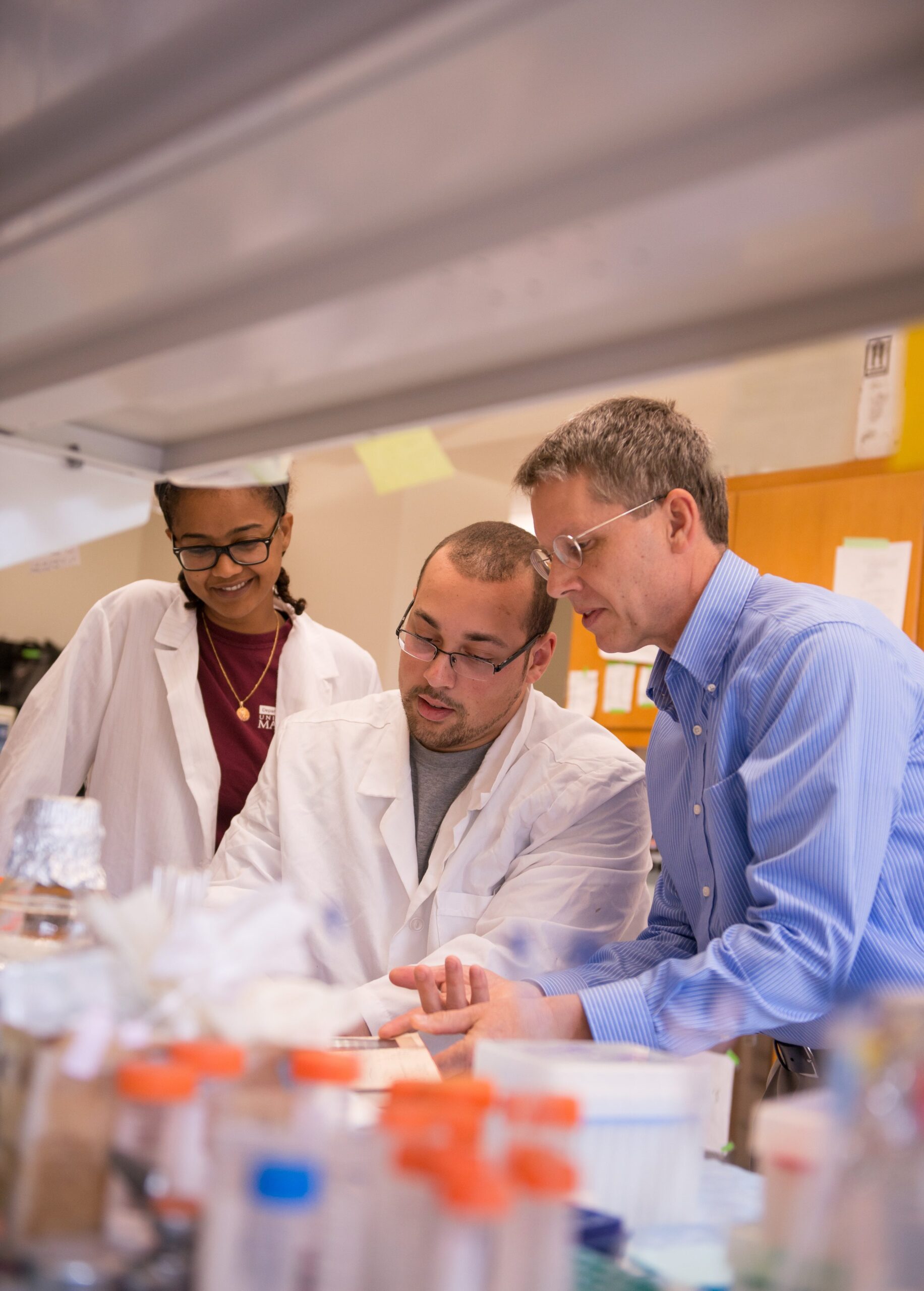A recent article in Nature asked, “Is science only for the rich?” In the United States, writer Jane J. Lee concluded, there are steep challenges for students from lower-income backgrounds who want to pursue science, but there are also positive examples of people who are working to create opportunities for these students—people like Michael Summers.
Summers is Robert E. Meyerhoff Chair for Excellence in Research and Mentoring and University Distinguished Professor of chemistry and biochemistry at UMBC. His lab is nationally and internationally known for engaging students from all backgrounds in high-level, hands-on research from day one, and further supporting them through intensive faculty and peer mentorship.
Tina Quasney ’17, biochemistry, who is featured in the article, was close to giving up on a science career when she crossed paths with Summers while working at a restaurant. In a conversation that could have ended at small talk, Summers recommended Quasney email him to learn about lab research opportunities. Rather than waiting tables, he said, “You could be getting paid for what you want to do.”
Quasney jumped at the chance to gain lab experience and is now on a path to graduate school. “I’ve learned so much about how to become a researcher,” she shares. As a student with serious concerns about funding her education, learning that Ph.D. students can earn tuition remission and a stipend has made it possible for her to see an advanced degree as a real option.
Roald Teuben ’16, biochemistry, shares a similar experience of connecting with the Summers Lab. He was in the UMBC chemistry building admiring a piece of equipment from the hallway when Summers greeted him with, “You must be here to do research.” “When I picked my jaw up off the floor, I just said ‘Yeah,’” remembers Teuben, who transferred to UMBC from Montgomery College. After two years working in Summers’ lab, he graduated last spring and is now serving as a lab technician while he applies to M.D./Ph.D. programs.
Aishwarya Iyer ’18 and M26, biochemistry, says the lab’s emphasis on a deep understanding of the research, asking good questions, and positive mentorship “made me more confident in my ability to think for myself,” and “really boosted my ability in science.” Iyer plans to pursue an M.D./Ph.D., with a focus on exercise physiology and metabolic conditions.
Hannah Carter ’17, biochemistry, has similar feelings about her UMBC experience. “The mentorship provided by the graduate students in the lab is remarkable,” she shares. Summers handpicks all of his lab members based on interviews that focus on students’ goals and passions, and their enthusiasm for supporting fellow students, rather than simply past achievements on their résumés.
Amalia Rivera-Oven ’16, biochemistry, found her way to the Summers Lab when she introduced herself to President Freeman Hrabowski as the president of the Hispanic Latino Student Union at an event, hoping to discuss how the organization could grow and contribute to the community. He invited her to a meeting, which turned into a discussion of the importance of Latina leaders in STEM fields. Hrabowski helped her see, “By pursuing STEM, I can help to create a role model effect.”
Prior to her work in the Summers Lab, Rivera-Oven struggled with “impostor syndrome,” the experience of feeling that one doesn’t belong despite performing at a very high level. She says President Hrabowski and Professor Summers initially “saw something in me that I didn’t.” Through mentoring other student researchers in the Summers Lab, she grew her sense of self-confidence. She plans to pursue an M.D./Ph.D. after graduating in December.
Stanley Wang ’18 is also passionate about research, but even more so about service. As a first-generation college student whose parents are both immigrants, “College was never really on the radar,” he shares. But with several of his family members affected by gastrointestinal cancer, he says, “What drew me to research was finding solutions.” Wang earned a scholarship to attend UMBC, and plans to pursue Officer Candidate School in the military as well as a Ph.D., to fulfill what he calls his “first obligation” of serving his community.
Summers’ sense of duty as a scientist and educator has long guided his support of students from diverse backgrounds—particularly women, African American and Hispanic students, and first generation students—in becoming scientific research leaders.
Growing up, Summers says, “I knew little about issues that are differentially faced by people from different backgrounds. I went to high school with some very talented women and African Americans, but had no idea the odds of them obtaining a faculty position were so different from my own.”
“Being at UMBC opened my eyes not only to existing disparities in science research and education, but also to possibilities for effecting change,” he reflects. “The satisfaction that goes with helping our students achieve their dreams, and showing colleagues elsewhere new ways that they can approach and support their own students, is a reward without measure.”
Read the original article in Nature: “Is science only for the rich?”
Image: Summers (right) works with students in the lab; photo by Marlayna Demond ’11 for UMBC.
Tags: ChemBiochem, CNMS, Research, Undergraduate Research

